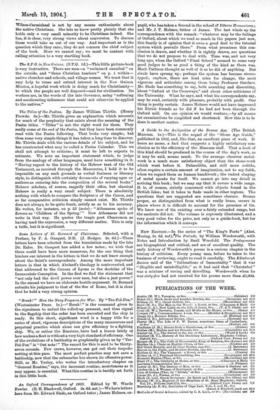The Titles of the Psalms. By James William Thirtle. (Henry
Frowde. 6s.)—Mr. Thirtle gives an explanation which accounts for much of the perplexity that exists about the meaning of the Psalm titles. " Titles " is not the right word for them. They really come at the end of the Psalm, but they have been commonly read with the Psalm following. That looks very simple; but then some very simple things it has taken a long time to discover. Mr. Thirtle deals with the various details of his subject, and he has constructed what may be called a Psalm Calendar. This we shall not attempt to criticise; it must be left to experts to estimate. We note an important statement which, to judge from the analogy of other languages, must have something in it. "Having regard to the history of the Hebrew text- of the Old Testament, as received through the Massoretes, I hold it to be impossible on any such grounds as verbal features or literary style, to distinguish with certainty documents of varying ages or authors as entering into the composition of the several books." Hebrew scholars, of course, magnify their office, but classical Hebrew is really a very small subject. There is absolutely nothing with which to compare the Scriptures of the Canon, and SO far comparative criticism simply cannot exist. Mr. Thirtle does not always, to be quite frank, satisfy us as to his accuracy. He writes, for instance, on p. 22 (note) : " Athenaeus spoke of flowers as 'Children of the Spring.' " Now Athenaeiug did not write in that way. He quotes the tragic poet Chaeremon as having used the expression, a very different matter. This is only a trifle, but it is significant.










































 Previous page
Previous page